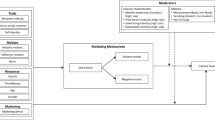Abstract
Theodore Levitt criticizes John Kenneth Galbraith's view of advertising as artificial want creation, contending that its selling focus on the product fails to appreciate the marketing focus on the consumer. But Levitt himself not only ends up endorsing selling; he fails to confront the fact that the marketing to our most pervasive needs that he advocates really represents a sophisticated form of selling. He avoids facing this by the fiction that marketing is concerned only with the material level of existence, and absolves marketing of serious involvement in the level of meaning through the relativization of all meanings as personal preferences. The irony is that this itself reflects a particular view of meaning, a modern commercial one, so that it is this vision of life that LevittÕs marketing is really SELLING.
Similar content being viewed by others
Author information
Authors and Affiliations
Rights and permissions
About this article
Cite this article
Grant, C. Theodore Levitt's Marketing Myopia. Journal of Business Ethics 18, 397–406 (1999). https://doi.org/10.1023/A:1005817506423
Issue Date:
DOI: https://doi.org/10.1023/A:1005817506423




